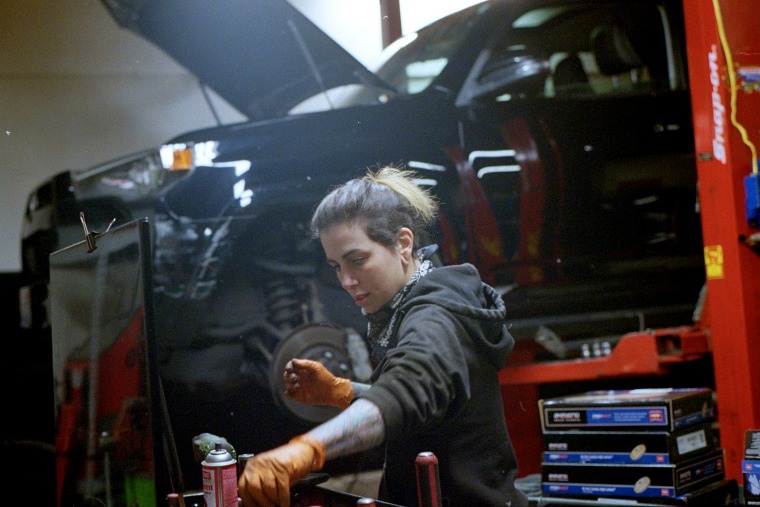After eight years and almost twice as many jobs, El Scherker was done with the auto industry — or at least, that’s what they thought.
Scherker, who uses gender-neutral pronouns, grew up with a grandmother who epitomized the power of DIY. With her help, Scherker quickly learned how to fix up an old Chevy van, fell in love with the process and decided to pursue a career in auto repair. But in shop after shop, their experience was largely characterized by transphobic harassment and confrontation, and it took a toll.
Scherker hit their breaking point in 2013. They sold most of their tools and took a job at a coffee shop in Seattle, where tips were good and cars were irrelevant. But, like most detours, it didn’t last long. About a year later, after fixing a co-worker’s car, they found themselves once again in an auto shop, and this time it was different — because the shop that pulled them back in was queer-owned.
“I walked in, talked to the owner, Eli, and was working there the next week,” Scherker said. “Working there gave me the confidence to realize I actually wanted to stay in the industry. Eli was creating space for folks and customers who needed it, you know? And they had a lot of patience with me from the beginning. Within a few weeks, I was working there full time.”
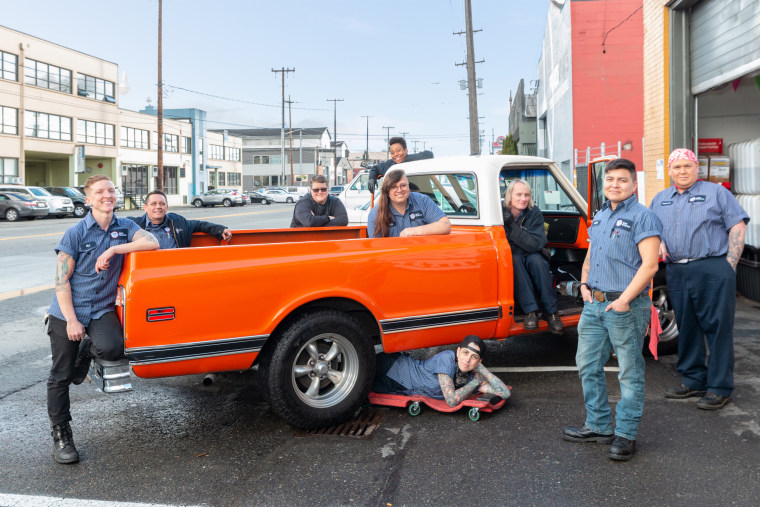
That shop was Repair Revolution, founded in Seattle in 2012 by mechanic Eli Allison. In an industry that both Allison and Scherker characterize as rife with toxic masculinity and homophobia, Allison hopes Repair Revolution is an oasis — a place where any type of person, queer or not, can take their car sans judgment. The space itself has an open layout to invite folks in, and as far as the staff is concerned, every single mechanic who works there is either female, queer or both. For Scherker, it was a godsend, and the reason they’re still in the industry today.
Scherker’s experience in the auto industry as a trans person is not unique. In their experience, on both sides of the counter, folks who are visibly queer or don’t otherwise conform to traditional gender roles aren’t always welcome.
“I was told, if you want to be successful, just put your head down, do well,” Allison, who uses gender-neutral pronouns, said of their early days in the industry. “You have to work twice as hard. I used a female name and pronouns at the time, and it was as if I represented all women and queer people to them, so I had to prove that women can do this work. It was like, if you want to do this, you have to be OK with dudes sexually harassing you in the tool room — just really insane stuff. And every person that I've interviewed for a technician position that is either female or queer has had just horrible stories of what they endured in order to make it in this profession.”
In 2017, a survey of 900 women who work in the automotive industry echoed Allison’s sentiments. Sixty-five percent of respondents said they had been subjected to unwanted sexual advances at some point during their career, and 80 percent of respondents said they had witnessed sexist behavior at least once at company off-sites or industry conferences.
Jill Trotta, the vice president of industry, sales and certification at RepairPal, an online network of repair shops, has been working with Women in Auto Care to address issues of diversity and inclusion since 2013.
“The auto industry really seriously lacks diversity in all aspects,” she said. “I don’t think there’s been marked improvements in the past 30 years. With the climate in 2020, it became very trendy to talk about diversity and inclusion, but I’m interested to see if we can carry on and drive that change through.”
Meanwhile, Allison’s decision to open up their own shop — versus, say, simply escaping the industry for good — was their way of answering a seemingly simple question: What if there was another way?
“Every single day we hear from at least one customer about what an amazing experience this has been and how much more they knew about their car when they left this place than when they came in,” they said. “That's why we exist. That gives me hope that people are hungry for this.”
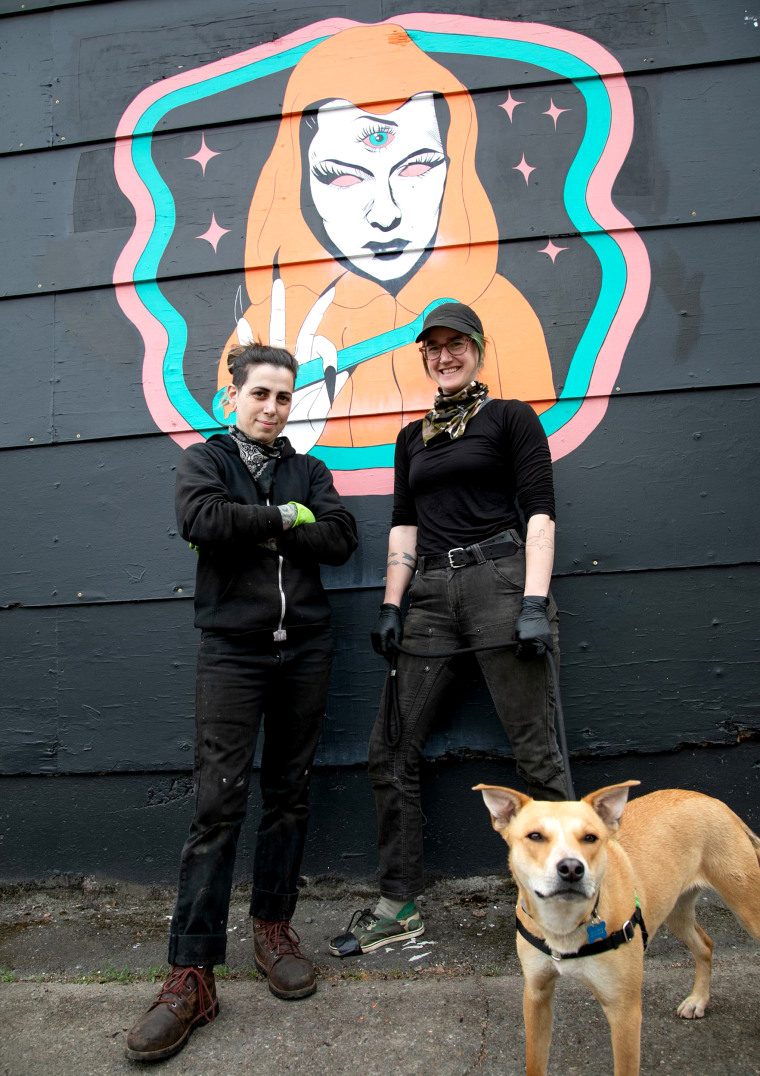
After six years of working under Allison’s mentorship, Scherker moved south to Portland, Oregon, and opened their own shop in 2020 called Stargazer Garage. They adopted Repair Revolution’s people-first model, which focuses on transparency, inclusivity and accessibility above all else.
“We try to, from start to finish, to build relationships with our customers,” Allison said. “I think that as a queer-owned business that exists to change this industry or, at the very least, disrupt it, we are for and by our community, you know? So that’s a whole other level of accountability. This is my community that I'm working for. There's more at stake.”
Every interaction with every customer is obviously different — in the same way that every car is different. But Chaya Milchtein, a queer automotive educator, journalist and founder of Mechanic Shop Femme, said the through-line is education: allowing customers to peek under the hood, quite literally. She considers this a key ingredient to truly transforming the industry as a whole.
“Studies have shown that people who educate themselves on topics like cars are more empowered and more willing to give that ‘no’ answer when they walk into a car repair shop and don’t feel respected,” she said. “The most powerful way that we can make an impact is by saying ‘no’ and by refusing to give our business to people who disrespect us intentionally, or if they refuse to respect us after we’ve corrected them when they do so unintentionally.”
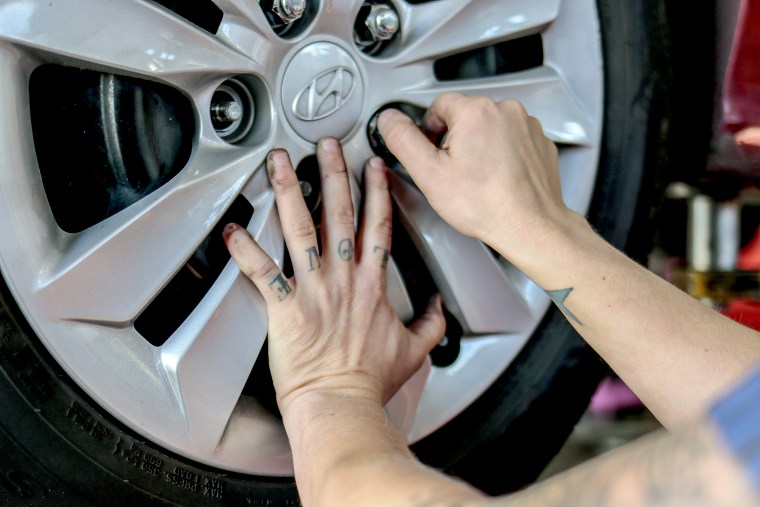
Scherker said in shops like Repair Revolution and Stargazer Garage, the power dynamic they previously witnessed between mechanic and customer — which can leave an uneducated customer vulnerable to manipulation — is notably absent. Instead, they said knowledge is traded freely between folks, all of whom seem eager to learn.
Becca Houser started working at Stargazer Garage after purchasing a truck as a personal project and learning how to fix it up. She said Scherker took her under their wing.
“El is very good at explaining things in a relatable way,” Houser said. “It’ll be like, here’s this intimidating thing, here’s this whole engine, and they’ll compare it to like … you making toast in the morning. It’s just about taking time to treat people with respect. We never want anyone to feel dismissed.”
Outside the walls of these decidedly nontraditional shops, mechanic Sarah Tilton says the industry as a whole has a long way to go.
Six years ago, in Austin, Texas, Tilton founded Yes We Can Auto Repair, a mobile mechanic service, as a way to circumvent those environments. She’s the unofficial mechanic of the local drag scene and sometimes gets calls at 2 or 3 in the morning from folks who are stranded and don’t feel safe calling anyone else.
“One of the [drag queens], he walked into a shop and said it was like being back in high school again, being bullied for being gay,” Tilton said. “So I did a comparison quote and helped him out, and it was a much better experience, much less traumatic. In an ideal world, it would be nice to see the industry change, for people to stop having these experiences. But I don’t see it changing anytime soon.”
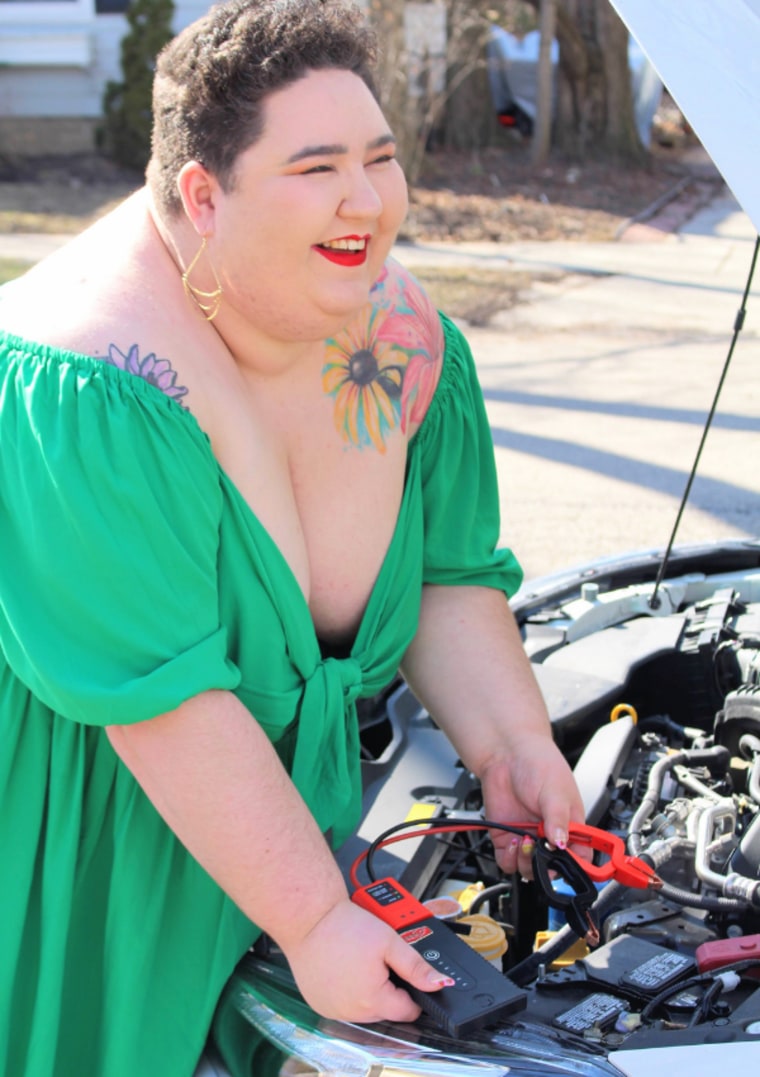
Similarly, Milchtein doesn’t recommend waiting for a change that may never come from traditional, conservative shops.
“I think the most powerful way to navigate the auto industry is not hoping it will change to conform to our identities and our needs,” she said.
As for Trotta, she said small, incremental steps forward are happening in the industry already — if you know where to look. She cited the Center for Automotive Diversity, Inclusion and Advancement (often referred to as CADIA) as an example. The organization, which is having Trotta speak at an upcoming panel, provides workshops, development training and certifications with the goal of doubling the number of diverse leaders in the automotive industry by 2030.
“There is definitely some resistance to changing the status quo,” she said. “But if we can keep these efforts going, we’ll get there. Vote with your dollar. If there's a situation where you walk in and you feel uncomfortable, think twice about spending your dollars there.”
Ultimately, the more environments that prioritize equity and inclusivity — within the auto industry and otherwise — the better, Trotta said. Operations like Repair Revolution, Stargazer Garage and Yes We Can Auto Repair are responding to a need, and, eventually, if other shops hope to attract LGBTQ customers, they’ll follow suit.
“I just want to be ourselves, you know what I mean?” Scherker said. “And I hope that that radiates outward and people can see us running the shop, being as weird and open and out and just who we are, and that will attract other people and signal to them that they’re safe here.”
